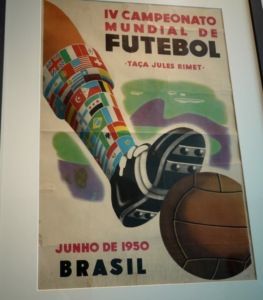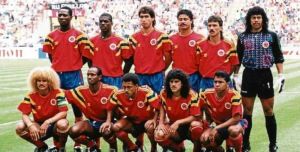Had Denmark beaten Croatia last night in the last-16 of the 2018 World Cup, they would have faced Russia in the quarter-finals, and then either England, Colombia, Sweden or Switzerland in the semis. It’s hardly Euro 92, is it?
That year they had to escape a group containing England, France and hosts Sweden, then knock out the best Dutch side since Johan Cruyff’s orange army in 1974, and beat reigning world champions Germany in the final.
A semi without the superpowers
Whoever does end up emerging from Denmark’s side of the draw could claim to have had the easiest ever passage to a World Cup final.
Only one of the last six finalists have made it without facing Brazil or Germany – Argentina in 2014, although they had to see off the 2010 finalists, the Netherlands, in the semis.
Following Spain’s elimination, only one previous winner (England in 1966) and other finalist (Sweden in 1958) remain, but neither have made it through in the modern era.
We would have to go back to 2002 to find a finalist, or indeed finalists, who had it easy. Brazil saw off Belgium, England and Turkey , and we’ll deal with the other one later.
What could have been
In the aftermath of Denmark’s defeat, the nation is left to rue what could have been a realistic opportunity to make their first ever final.
Accordingly therefore, we’re today saluting the teams who over the years have benefited from the shock failures of football’s elite – whether it’s to qualify (in 2018: Italy and the Netherlands), or to make it through the group stage (Germany) or early knockout rounds (Spain) – with our selection of the 11 luckiest cup draws ever.
So all together now (see video below): “You lucky, lucky bastards!”
Oh, and there’s a familiar name up first.
11/ Denmark, 1964 European Championship semi-finalists
Denmark became the luckiest European Championship winners ever after they replaced Yugoslavia at the 11th hour in 1992 and won a tournament they had already been technically knocked out of. However, a glance at the archives reveals this was not their first brush with fortune in this competition. To reach the semi-finals of the 1964 edition Denmark only needed to beat three teams, two of which, Malta and Albania, were ranked in the bottom ten in the world, while the other, Luxembourg who they met in the quarter-finals (!), were not far off. Since then the tournament has sensibly taken on a group-based format in which Malta, Albania and Luxembourg are still a major influence, but only on goal difference.
10/ Steaua Bucharest, 1986 European Cup winners
Ironically this was one of the few results in Romanian football during the 1980s not fixed by the Ceausescus. In the absence of the banned English clubs that had won seven of the last nine finals, Steaua enjoyed one of the easiest paths to a final in European Cup history, dispatching the champions of four welterweight nations – Denmark, Hungary, Finland and Belgium – on their way. Fittingly for such an undeserved title, they won the final on penalties, beating Barcelona who (as we shall see later) have a habit of losing to lucky bastards.

9/ Millwall, FA Cup finalists
Millwall used up a century’s worth of luck in making the final of the 2004 FA Cup, managing to get there without facing a single club from the top flight. Three Division One clubs, a Second Division side and a Conference outfit provided the opposition, but in the end the Lions from South London, with a young Tim Cahill in the side, had roared to the point they had no puff left and they lost 0-4 to Manchester United in one of the most one-sided finals in history.
8/ Spain, 1992 Olympic Champions
Given the unblemished record of the Olympic movement, the possibility of bias towards a host nation is a remote one, so any suggestion Spain were deliberately handed a favourable draw in 1992 is bordering on the absurd. After all, both Colombia and Egypt had been at the 1990 World Cup finals while Qatar are an oil-rich state who could have bought half the Brazilian national side if they wanted to and still had change for Hristo Stoichov. Alas none of them could prevent Spain’s utter domination of the group, scoring eight goals to nil, and eventual path to the goal medal past Italy, Ghana and Poland (wind assisted by red card decisions in the quarter and semi-finals).
7/ Uruguay, 1930 and 1950 World Cup winners
When World Cup archivists remember Uruguay’s 1930 World Cup winning squad their preoccupation is more often with the number of limbs on show (one of their goal-scorers in the final, Castro, only had one upper arm) than the criminal ease with which they made it to the final, courtesy of group stage wins over Romania and Peru, and a 6-1 drubbing of Yugoslavia in the semi-finals. Then, amazingly, in the chaotic 1950 World Cup in Brazil (which had a bizarre final group stage instead of a final) they once again only had to play four games to win the title. Due to a few last minute withdrawals this time there was only one other team in their group, Bolivia who they beat 8-0, while most of their rivals were in groups of four. The WC organisers could have altered this as there was no geographical basis to their make-up, meaning that most of Uruguay’s opponents in the final group stage (other than Brazil of course) had already seen more of the country than most Amazonian nomads.

6/ Liverpool, 1992 FA Cup winners
Liverpool’s victory in 1992 was a bitter blow for a generation of Reds haters who had only started that season to truly believe that two decades of dominance might be over. Liverpool had finished outside the top two in the First Division (in its final season before becoming the Premiership) for the first time since 1981, but were never troubled in the cup thanks to the early exits of D1 champions Leeds United, Arsenal and Manchester United. On their way to the final they only encountered one top flight club – Aston Villa at home in the quarter-finals – and then barely had to break sweat to beat Sunderland, who had finished a lowly 18th that season in the Second Division. In hindsight, Reds haters took solace that it influenced Liverpool’s decision to retain Graeme Souness as manager. By the time he had gone two years later the damage was irreversible.
5/ France, 1998 World Cup winners
While form sides Argentina, Brazil and the Netherlands all found themselves in the top half of the draw for the last 16, France, following the sort of lightweight group (South Africa, Saudi Arabia and Denmark) that only the host nation ever seems to get, had a relatively smooth path ahead of them. On paper Italy might have looked like a tough test in the quarters, but they were ideal opponents given their reluctance to score. From the group stages to the semis France went 261 minutes of normal time without scoring but still never looked like losing to either Paraguay (ordinary), Italy (equally insipid) or Croatia (not as good as in Euro 1996). Had they faced tougher teams they probably would have failed.
4/ Colombia, 2001 Copa America winners
Hosts Colombia finally broke their duck in the Copa America in 2001, beating Mexico in the first final of the biennial tournament since 1987 to feature neither Argentina nor Brazil. Argentina had withdrawn before the tournament kicked off after death threats were issued against their star players, while Brazil sent a severely weakened side in the hope they wouldn’t win and return as cargo. Colombia won the tournament, which was nearly cancelled after the vice-president of Colombia’s football federation was kidnapped, without conceding a goal, beating Chile, Ecuador and Venezuela in the group stage, and then Peru, Honduras and Mexico in the knockout stage.

3/ Manchester United, 1990 FA Cup winners
The cup run that saved Fergie’s bacon, gave Mark Robins and Lee Martin their 15 minutes of fame and spawned a dynasty, started with a tricky away encounter at Nottingham Forest on a blustery Sunday in January 1990. A narrow 1-0 victory was followed by wins over three Second Division clubs and one Fourth Division outfit as United closed in on their first chance of silverware since Ferguson’s arrival in 1986. As against Oldham Athletic in the semis, United were second best against an Ian Wright-inspired Crystal Palace in the final, but destiny was clearly on their side and the rest is history.
2/ Manchester United, 1991 Cup Winners Cup winners
Fergie’s luck held firm as the cup run continued. Italian clubs had completed a clean sweep of the three major European trophies in 1990 while England had not been represented in a European tournament since 1985. Surely a rusty Manchester United would be no match for defending champions Sampdoria or Italian Cup winners Juventus? Well, not if they avoided them in the draw. Wins over Hungarian minnows Pecsi Munkas and lowly Wrexham found United in the quarters with the Italian giants, Dynamo Kiev and Barcelona. United unsurprisingly avoided them all, beating Montpellier in the quarters and Legia Warsaw in the semis before a deserved win over Barcelona in the final.
1/ Germany, 2002 World Cup finalists
Ahead of the 2002 World Cup finals most pundits were predicting a showpiece showdown between Brazil, Argentina or France and Spain, Italy or Portugal. Germany, they reasoned, were a shadow of their former self and a distant fourth choice to make it ahead of the southern Europe trio. However, what they hadn’t counted on was the South Korean avalanche and good old German experience. It was as if Germany was watching from above, skiing through the powder snow waiting for the avalanche to run out of steam. South Korea knocked out Italy and Spain; Germany scraped past Paraguay and the USA – it hardly seems fair does it? Indeed, had South Korea not beaten Portugal in the group stages, Figo and co would have probably faced Germany in the quarters instead of the MLS eleven that did. By the time South Korea faced Germany it surprised few that the avalanche had stopped and vertigo had set in. It meant that the weakest German side in living memory had made it through to another world final on the back of three 1-0 wins over sides hopelessly out of their depth.














